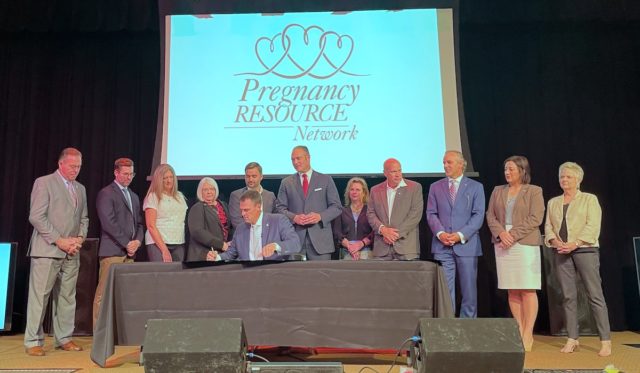
On Nov. 1, 2021, a number of new abortion laws are scheduled to go into effect in Oklahoma which will cumulatively make it nearly impossible to obtain legal abortion in the state.
On Sept. 9, Gov. Kevin Stitt issued a press release celebrating the new abortion restrictions as a pro-life victory.
“I promised Oklahomans I would sign every piece of pro-life legislation that came across my desk and I am proud to keep that promise,” Stitt stated. “As a father of six, it’s an honor to be the most pro-life governor in the country and I will always step up to protect the lives of unborn children.”
Stitt also recently told The Frontier that he would “absolutely” sign a bill similar to one recently enacted in Texas, which allows private citizens to sue abortion providers and anyone else who “aids and abets” an abortion. Sen. Nathan Dahm (R-Broken Arrow) has said he plans to introduce such a bill in Oklahoma.
But what Stitt and these laws ignore is that taking away the right to choose will not stop abortion — it will only stop safe abortion. It seems the pro-life lawmakers in this state did not stop to consider the living, breathing women whose lives and safety will be put in jeopardy on Nov. 1 unless a lawsuit filed by reproductive rights advocates in September is successful.
Similarly, these politicians rush to ban abortion procedures while failing to implement policies that would actually reduce the need for abortions and improve people’s lives.
All of this prompts the question: When will the term “pro-life” protect the living?
Concern for life should extend beyond abortion
Stitt is proud to proclaim himself the most pro-life governor in the country, but when it comes to children’s lives after birth, the state does not rate highly.
In 2018, Oklahoma was ranked the fourth worst state in the United States for maternal mortality, with 30.1 maternal deaths per 100,000 live births, compared to a national rate of 17.4. Likewise, in 2020, Oklahoma had the fourth-highest rate of infant mortality in the country.
According to the 2020 Kids Count Profile, published annually by the Annie E. Casey Foundation, Oklahoma ranks 45th overall for child well-being, 48th in education, and 49th in children’s health.
Mothers are also suffering. Oklahoma ranks 41st in the nation for women in poverty, with 17.5 percent of women 18 and older in poverty.
Being pregnant and raising a child are expensive, and many potential mothers do not have the resources to pay for these costs — especially if they need to pay for childcare.
A truly pro-life approach to policy would prioritize meeting these needs.
We need sex education, accessible contraception
There are also common-sense ways to reduce abortions by reducing unplanned pregnancies.
Oklahoma law does not require comprehensive sex education in school and requires only that schools provide HIV/AIDS prevention education. If schools do provide sex education, it is required that the curriculum “have as one of its primary purposes the teaching of or informing students about the practice of abstinence.”
A better approach would be requiring comprehensive sex education. Instruction would still include the benefits of delaying sexual intercourse and would also provide information on normal reproductive development and how to prevent STIs and unplanned pregnancy. Comprehensive sex education goes even further, to teach about forms of sexual expression, gender identity, healthy relationships and how to recognize and prevent sexual violence.
Let’s be real: Neglecting to teach kids about sex, or teaching only abstinence, is unrealistic. Why not teach our adolescents how to protect themselves instead of begging them not to do the inevitable? It’s time to stop teaching our youth that pregnancy is a punishment for engaging in sex.
Furthermore, contraception should be accessible and affordable, even for minors.
Currently, even though the age of consent in Oklahoma is 16, Oklahomans under the age of 18 must have parental permission to get a birth-control prescription except for a few narrow exceptions, such as if the teen is married, legally emancipated or already pregnant. (An exception is if a teen goes to a federally funded Title X clinic, which provides confidential family-planning health care to low-income people, including adolescents.)
Free and more widely accessible contraceptives can reduce the number of unplanned pregnancies, lessening the demand for abortion. This would require changing laws and attitudes about contraception and broadening access to affordable health insurance and health care.
Unlike the new abortion restrictions going into effect on Nov. 1, common-sense measures such as affordable contraception, comprehensive sex education and getting women and children out of poverty would lessen demand for abortion in our state while exhibiting care for people throughout their lives.
Women deserve the right to choose what is best for ourselves without the government enforcing these unconstitutional regulations.






















